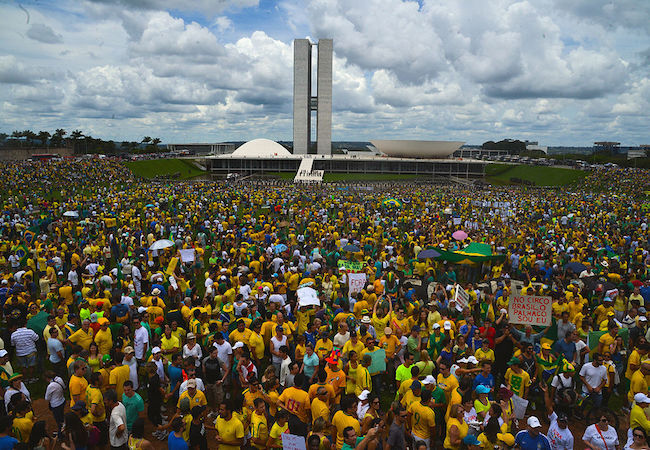“Dilma Out”, was voiced by hundreds of thousands across Brazil

Hundreds of thousands of demonstrators took to the streets across Brazil to call for the impeachment of president Dilma Rousseff, whom they blame for a vast corruption scandal and the economy’s worst slump in a quarter-century. Less than a year into her tumultuous second term, the president’s support has dwindled to single digits in recent polls, while two in three support calls for her impeachment.
Crowds chanting “Dilma out!” and singing the national anthem paraded through the capital Brasilia, Rio de Janeiro, the country’s largest city Sao Paulo, and across Brazil.
The Sao Paulo G1 news site reported a police estimate of 419,000 protesters in dozens of cities and towns, while organisers claimed a total of 664,000.
Protesters swarmed to midday marches on Rio de Janeiro’s Copacabana Beach and in front of congress in the capital Brasilia.
Sunday’s protests were the third major demonstration of the year against Dilma Rousseff. Support for the protest movement remains widespread as rising unemployment and inflation presage the worst economic downturn since at least 1990.
Government austerity efforts meant to keep the country’s investment-grade credit rating have also turned off Rousseff’s supporters and met resistance from politicians.
A Datafolha survey this month showed impeachment has the most support among the poorest and least educated Brazilians, who overwhelmingly backed Ms Rousseff in her narrow re-election victory last October.
Rousseff, a former leftist guerrilla, has likened impeachment threats to a coup plot and insists that she cannot be forced from office. The Globo news site reported she would discuss the situation with ministers later on Sunday.
Sensing weakness, congressional leaders have sabotaged much of the president’s legislative agenda. The leader of the lower house of congress, who is responsible for moving ahead with an impeachment vote, broke entirely with her government last month.
The president had measured success this week consolidating support among restive senate leaders for a pro-business agenda. But their alliance remains fragile.
Further complicating a bribery and money-laundering investigation at state-run oil company Petrobras has spilled into the political realm as the prosecutor-general readies charges against sitting politicians.
Brazil’s biggest-ever corruption scandal already landed several of the country’s most prominent executives in jail, and plea deals have implicated congressional leaders and senior members of Rousseff’s party and government.
Rousseff’s Workers’ Party has been badly shaken by the scandal and she has been tainted by association, even if not directly implicated since she chaired Petrobras from 2003 to 2010. Furthermore her party’s treasurer was among those arrested in April. Even Rousseff’s presidential predecessor and political mentor, Lula da Silva, is being investigated in an unrelated influence peddling probe.




